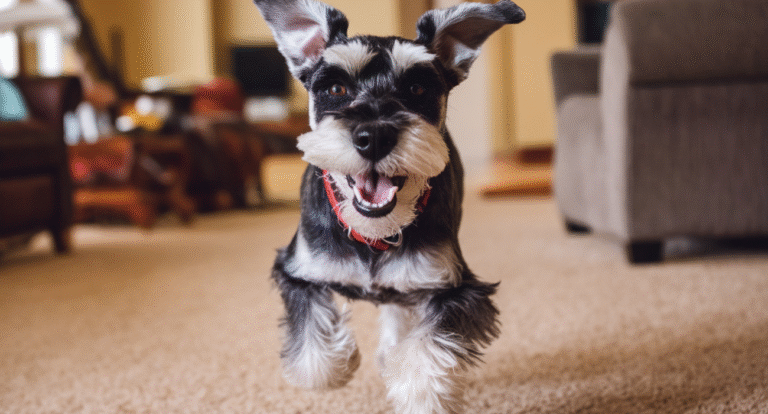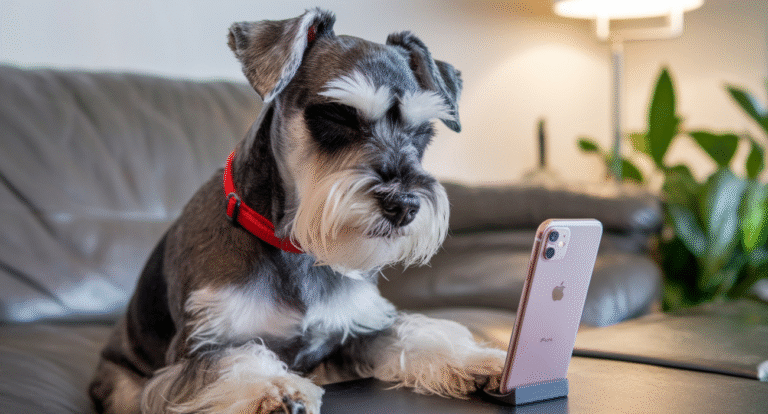If your Schnauzer scratches and digs at your bed, it’s not random. Uncover the funny and surprising reasons behind this quirky habit.
Your cozy bed feels like a fluffy paradise, but to your Schnauzer it doubles as a construction site. One minute they’re curled up sweetly beside you, the next they’re pawing furiously like they’re trying to dig a tunnel to the other side of the world.
While it might leave you scratching your head or worrying about your blankets, this behavior is actually rooted in some fascinating canine instincts. Let’s uncover why your Schnauzer loves to dig on your bed and what you can do about it.
The DNA Detective Story: It’s All in Their Genes
Thousands of years ago, dogs didn’t have memory foam mattresses or Egyptian cotton sheets. They had dirt, leaves, and the great outdoors. Digging became their interior design solution. These wild canines would scratch and paw at the ground to create the perfect sleeping hollow, removing rocks, smoothing rough patches, and creating a cozy depression that fit their body just right.
Fast forward to today, and your pampered pooch is still carrying those ancient blueprints in their genetic code. When they hop onto your bed and start their frantic digging dance, they’re not being destructive; they’re channeling their inner architect. Your soft mattress triggers the same instinctual response that dirt once did for their wild relatives.
Every scratch and paw movement on your bed is your Schnauzer’s way of saying, “I’m making this space perfectly mine, just like my ancestors did in the wilderness.”
This instinctual behavior is so deeply ingrained that it’s virtually impossible to eliminate entirely. Understanding this helps explain why even the most well-trained Schnauzer might suddenly transform into a furry excavator when bedtime approaches.
The Comfort Engineer at Work
Your Schnauzer isn’t just randomly pawing at your bedding; they’re conducting a sophisticated comfort assessment. Think about your own bedtime routine. You probably flip your pillow to find the cool side, adjust your blankets, or move around until you find that perfect sleeping position. Your Schnauzer is doing something remarkably similar, just with more dramatic flair.
When they dig into your comforter, they’re testing the give of the fabric, checking the temperature underneath, and creating the ideal nest formation. Some Schnauzers have been observed making circular digging motions, almost like they’re following an invisible blueprint for the perfect sleeping spot.
This behavior becomes even more pronounced during different seasons. In summer, your pup might dig deeper to find cooler layers beneath the surface. In winter, they might create a more enclosed burrow effect with your blankets, seeking maximum warmth and security.
The Scent Science: Claiming Their Territory
Here’s where things get really interesting from a canine psychology perspective. Your bed is a scent goldmine to your Schnauzer. It smells intensely like you, their favorite human, mixed with traces of your daily activities, your shampoo, your laundry detergent, and countless other fascinating aromas.
When your Schnauzer digs on your bed, they’re not just making it comfortable; they’re mixing their scent with yours in a beautiful display of pack bonding. Each scratch releases pheromones from their paw pads, creating a scent cocktail that says, “This human belongs to me, and I belong to them.”
| Scent Source | What It Tells Your Schnauzer | Their Response |
|---|---|---|
| Your natural scent | “My human spends lots of time here” | Increased digging to blend scents |
| Fabric softener/detergent | “This smells clean and safe” | Comfort digging behavior |
| Other pets’ scents | “I need to establish my presence” | More vigorous territorial digging |
| Food/snack remnants | “Interesting! Let me investigate” | Focused, searching dig patterns |
This scent-marking behavior is particularly strong in Schnauzers because they’re naturally social dogs with powerful bonding instincts. Your bed becomes a central hub for family connection, and digging is their way of participating in that intimate space.
The Anxiety Release Valve
Sometimes the digging isn’t about comfort or instinct; it’s about emotional regulation. Schnauzers are sensitive, intelligent dogs who can experience anxiety, excitement, or restless energy just like humans do. When these emotions build up, they need an outlet, and your soft, safe bed becomes the perfect stress-relief station.
You might notice increased digging behavior during:
- Thunderstorms or loud noises
- Changes in household routine
- After exciting events like visitors or trips to the park
- When they sense you’re feeling stressed or upset
Think of bed digging as your Schnauzer’s version of stress-eating or nervous fidgeting. It’s a self-soothing behavior that helps them process overwhelming emotions.
The repetitive motion of digging provides a meditative, calming effect. The physical activity releases endorphins, while the familiar scent and texture of your bedding provide psychological comfort. It’s actually a pretty sophisticated coping mechanism when you think about it.
The Hunter’s Playground: When Prey Drive Meets Bedtime
Never forget that your adorable, beard-wearing companion was originally bred to hunt rats and other small vermin. Those hunting instincts don’t just disappear because they’re living in suburban comfort. Sometimes, your rumpled bedsheets look suspiciously like the perfect hiding spot for imaginary prey.
This is especially true for younger Schnauzers or those with particularly high energy levels. The digging motion mimics the same movements they would use to uncover hidden quarry in tall grass or underbrush. Even though there’s nothing actually hiding in your comforter, their brain says, “Better dig here just in case!”
You might notice this hunting-style digging is more focused and intense than comfort digging. They might cock their head, listening intently, or dig in specific spots rather than general areas. It’s like watching a tiny archaeologist at work, convinced they’re about to make the discovery of the century.
Redirecting the Excavation: Practical Solutions That Actually Work
While understanding the “why” behind the behavior is fascinating, you probably also want to protect your bedding investment. The good news is that you can redirect this natural behavior without suppressing it entirely.
Create a designated digging zone: Set up a special blanket or small dog bed that belongs exclusively to your Schnauzer. Choose something with interesting textures and make it clear this is their digging spot. Praise them enthusiastically when they use it instead of your bed.
Exercise is your secret weapon: A tired Schnauzer is often a well-behaved Schnauzer. Daily walks, play sessions, and mental stimulation through puzzle toys can significantly reduce restless digging behavior. Consider this formula: more energy burned during the day equals less frantic digging at night.
Interactive alternatives: Puzzle feeders, snuffle mats, and digging boxes filled with hidden treats can satisfy your pup’s natural urges in appropriate ways. These alternatives provide the same satisfying scratching and digging motions while protecting your furniture.
Remember, you’re not trying to eliminate a natural behavior; you’re simply giving it a better outlet. Work with your Schnauzer’s instincts, not against them.
The Management Approach: Setting Boundaries With Love
If the digging behavior is causing real problems, consider these management strategies:
Timing matters: Pay attention to when the digging happens most frequently. Is it right before bed? After meals? During specific emotional states? Understanding patterns helps you intervene proactively.
Calming techniques: For anxiety-driven digging, establish consistent bedtime routines that promote relaxation. This might include gentle brushing, quiet music, or aromatherapy designed for dogs.
Physical barriers: Sometimes a simple solution like keeping your bedroom door closed or using a dog gate can prevent access during your most frustrated moments while you work on training alternatives.
When Professional Help Makes Sense
Most bed digging is perfectly normal behavior that can be managed at home. However, if the digging becomes obsessive, destructive, or accompanied by other concerning behaviors like excessive panting, pacing, or loss of appetite, it might be worth consulting a veterinary behaviorist.
Sudden increases in digging behavior can sometimes indicate underlying health issues, particularly if your older Schnauzer suddenly develops new patterns. Joint pain, cognitive changes, or other medical conditions might manifest as changes in normal behavior patterns.
Embracing Your Schnauzer’s Quirky Side
Here’s the beautiful truth about living with a Schnauzer: they’re going to do Schnauzer things, and digging on your bed is just one of those endearing quirks that comes with the territory. Instead of viewing it as a problem to solve, try seeing it as a window into your dog’s rich inner life and ancestral heritage.
Your Schnauzer isn’t trying to ruin your day or destroy your bedding. They’re expressing love, seeking comfort, following ancient instincts, and trying to create the perfect shared space with their favorite human. When you understand the behavior from their perspective, it becomes less frustrating and more fascinating. After all, how many creatures love you so much they want to literally dig their way deeper into your life?






